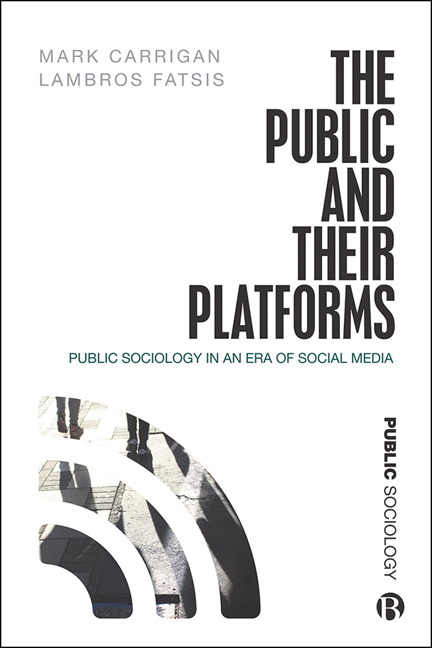Book contents
- Frontmatter
- Contents
- Acknowledgements
- Series Editors’ Preface
- Introduction
- 1 Defining ‘the Public’
- 2 The History of Platforms
- 3 Between Publics and Platforms
- 4 Sociology and its Platforms
- 5 The Past, Present and Future of Public Sociology
- 6 Making Sociology Public
- 7 Making Platforms Public
- 8 Assembling Public Sociology
- Notes
- References
- Index
4 - Sociology and its Platforms
- Frontmatter
- Contents
- Acknowledgements
- Series Editors’ Preface
- Introduction
- 1 Defining ‘the Public’
- 2 The History of Platforms
- 3 Between Publics and Platforms
- 4 Sociology and its Platforms
- 5 The Past, Present and Future of Public Sociology
- 6 Making Sociology Public
- 7 Making Platforms Public
- 8 Assembling Public Sociology
- Notes
- References
- Index
Summary
For many readers, the phrase ‘sociology and its platforms’ will immediately bring to mind images of blogs, Facebook pages and Twitter feeds through which sociologists engage with audiences beyond the traditional venues of conferences and scholarly journals. However, the thrust of our argument ha s been that we misunderstand such contemporary activity unless we consider it alongside the analogue platforms through which sociology has sought a relationship with a public. A platform in this sense is a position from which to communicate, facilitated by a material infrastructure, more or less able to draw attention and rendering some modes of reception more likely than others. For example, this monograph provides us with a position from which to speak, materialized through the codex book and its related apparatus of production and distribution. It encourages a monological mode of reception in which communicating about it or back to us as authors requires switching to another technology, with its capacity to draw attention being reliant on the publisher's leveraging interest in the topic and the authors within a difficult marketplace for scholarly monographs (Thompson 2005: 79).
There are many limitations to the codex book, which we’ll explore as part of the broader category of ‘legacy scholarship’. However, we want to be clear that we’re not advocating its wholesale rejection, as evidenced by the fact we’ve chosen such as technology to deliver our argument. Rather than dismissing the ‘old’ and valorizing the ‘new’, we’re trying to retrieve the technological aspect of publishing as an object of scholarly reflexivity. To get beyond the narrowly textual in order to understand the materiality through which it is delivered, as well as what this means for scholarship. To talk of sociology and its platforms in this sense is therefore a broader endeavour than the aforementioned focus on the digital would allow. It involves recognizing that sociology has always relied on platforms for sociologists to communicate, even if these depend on a legacy infrastructure of scholarly publishing (monographs, edited books, journals and so on) so familiar as to fade into the background for most of us.
- Type
- Chapter
- Information
- The Public and their PlatformsPublic Sociology in an Era of Social Media, pp. 79 - 102Publisher: Bristol University PressPrint publication year: 2021



